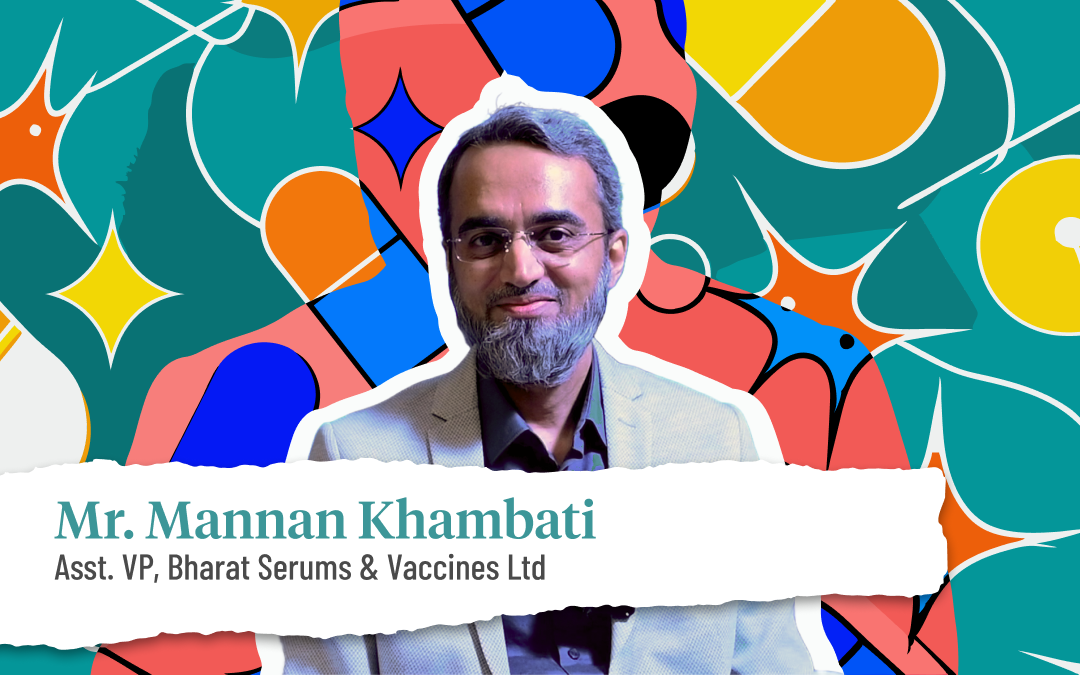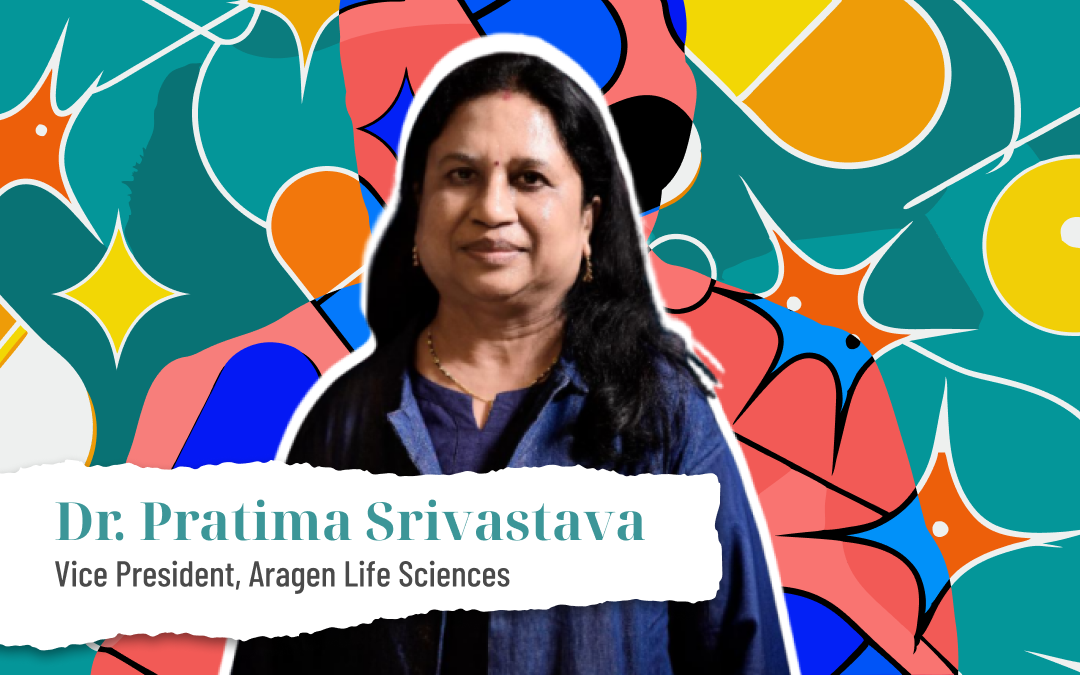QnA
Interview | November 26, 2024
ABOUT
Dr. Ashok Kumar Bhattacharya is a distinguished veteran of the pharmaceutical industry, renowned for his strategic vision and leadership excellence. With a career spanning decades, Dr. Bhattacharya has played pivotal roles in some of the world's leading pharmaceutical organizations, including GlaxoSmithKline, where he was integral to the merger with Burroughs Wellcome.
Dr. Bhattacharya's tenure as Executive Director at Takeda Pharmaceuticals India Pvt. Ltd. underscores his expertise in navigating complex markets and delivering impactful results. His portfolio includes spearheading marketing, sales, and business unit strategies while driving team building and fostering strategic partnerships. A Harvard alumnus with extensive industry knowledge, Dr. Bhattacharya remains dedicated to advancing healthcare solutions and mentoring the next generation of leaders in the pharmaceutical sector.
Pharma Now: Hello, welcome to Pharma Now, Dr. Ashok Kumar Bhattacharya. Dr. Bhattacharya, you are the former Managing Director of Takeda, and your insights will be interesting for all of us at Pharma Now. It's a pleasure to have you here, thank you for joining us.
Dr. Bhattacharya: Thank you, it's my pleasure too.
Pharma Now: So, when I was preparing for this interview, I read about your journey and career. And, I must say, I think you've already had experiences an individual can only dream about. So, through this conversation, I really want to understand your journey and how it feels to become a Managing Director of Takeda. I would love to know what it was like for you to be a part of the big merger and acquisition with GSK. For us, these names are some very big names, so learning more about your experiences through this will be inspiring for our audience.
Dr. Bhattacharya: First of all, I have been very fortunate to have worked for companies like GSK, Burroughs Wellcome, Merck, and Takeda. I have been fortunate enough to work for global research-based organizations. One of the things I learned while working at these organizations–which kept me running and pumping–was patient centricity.
Today, it's jargon. But, 40 years ago, during my training program at Burroughs Wellcome, it was very important. This was our foundation. We had joined an organization that looked after patients’ health. Believe me, I joined at the lowest level of the pharmaceutical company; I joined as a medical representative. Can you believe that?
Pharma Now: It is certainly difficult to believe. But, I think this will definitely inspire our young audience–students and young professionals–who feel like they’re at the bottom of the chain right now. But, why did you join as a medical representative?
Dr. Bhattacharya: I wanted to understand everything about the pharmaceutical industry. What do people go and tell doctors? Why are they doing specific processes? When are they doing these processes? How are they doing these processes? I don't think these questions were answered during my management days. So, I wanted to have firsthand answers because I always thought if I could understand and know the ground realities, I could climb to the top and lead successfully.
Pharma Now: So frankly, I think you’ve achieved that. I've always had a question regarding medical representatives: Why do medical representatives always wear ties?
Dr. Bhattacharya: You know, the exact same thing came to my mind as well, particularly during my early years. My dad was a very prominent doctor, so I also used to see such people quite often and wonder the same thing. So, there are multiple aspects to it. First, in those days, multinational companies dominated the market, and they had a dress code. The second thing is that this is a comprehensive experience. As a medical representative, you have very comprehensive experience of sales and marketing. You talk to the elites of society–that is, doctors and healthcare professionals. You talk to hospital authorities. At the same time, you also talk to pharmacy stores, who are not very educated. You talk to distributors who are also not very educated. So, this helped us stand out. As a medical representative, you need to learn how a businessperson allocates their resources towards an organization and product.
Pharma Now: Yes, because the scope is very large. There are many products available on the market.
Dr. Bhattacharya: Yes, the canvas is large. Why will they invest in my product? Why will they invest in my company? He is sitting there, he has a pile of money, and he wants a return on investment. This is something I learned by talking to doctors. As a medical representative, learning is a continuous process. If I had to discuss something with a doctor, it was an adult-to-adult platform. Therefore, my knowledge of diseases and pharmacology had to be much more than that of a doctor. Only I could create a need for my offering in the doctor’s mind. So, it was a great learning experience. I was not a medical representative for long. But, I worked in different regions. In those days, it was believed that if you worked in Bihar and UP and were successful, you could be successful anywhere in the world. I started working as a medical representative in Bihar, then I moved to Patna and Jharkhand. So, I spent some time there, and they didn’t have a lot of sophisticated things. But, it was a learning experience. Then, I became a first-line manager and came to Bombay.
Pharma Now: So, you started your career in Bihar, but I understand that you spent your initial years in Jharkhand. How was your experience shifting from Jharkhand and Bihar to Mumbai?
Dr. Bhattacharya: So, I completed my schooling from Jharkhand, and then moved. 1.5 years after becoming the first-line manager, I became the second-line manager. So, as the first-line manager, I came to Bombay. It was the most difficult place to survive. If you don't have shelter, it's very difficult to survive. I wanted to understand different people from different regions. After I saw one part of the country. I said, “Okay, let me have a metro experience.” I got that and became the second-line manager within 1.5 years. As a first-line manager, I learnt how to get things done. As a medical representative, I used to do things and I used to get commands. But as a first-line manager, I started giving them.
When I became a second-line manager, I was responsible for the entire West Bengal and Assam. I worked as a second-line manager for around nine months. That stint gave me an opportunity to learn how to manage large teams, provide directions, ensure clear communication, and how to monitor the team. Then, I came back to the head office in Bombay and got into marketing.
I had a successful stint in marketing as a group product manager. And this was because I understood what doctors wanted to hear and what they didn't.
Pharma Now: I think we can credit this to your experience as a medical representative. You understood doctors and how to communicate with them.
Dr. Bhattacharya: Yes! You can build a lot of strategies in an AC room, but they need to be implemented. So, my first point of sales were my people–medical representatives, first-line managers, and second-line managers–those who really implemented these strategies. My in-field stint gave me a lot of experience.
Pharma Now: Yes, I think you were able to implement this in the later stages as well. You then moved on to become the marketing manager. Which company did you work in at this position?
Dr. Bhattacharya: Burroughs Wellcome. There, I was a marketing manager. I learnt a lot of things: How do you manage human resources? How do you manage financial resources? These things I learnt, and luckily, I had good bosses. In fact, one of my bosses was the guru of the pharmaceutical industry: The late Dr. Tarun Gupta. He started the first pharmaceutical management course.So, I learnt a lot of things from him.
Later, GlaxoSmithKline Pharmaceuticals (GSK) and Burroughs Wellcome merged. Luckily, I was on the committee that was overlooking the merger. So, I got the opportunity to spear the acquisition of an Indian company and merge it into Glaxo-Wellcome, which was successful. I had a very good managing director, Mr. Homi R Khusrokhan. He gave me all the liberty and said, “This is your task you need to accomplish it. Don't come to me for everything. If you need something urgent or my intervention, you come.” So, that was a learning experience for me. Hearing him say this to me, I realized something: I was growing [in my field] because my boss had this attitude. So, I should emulate the same thing when I work with my juniors. So that they can grow. This was another learning for me: I had to give people freedom and not micromanage people
At GSK, I was the managing director. Mr. Sundaram, my boss said: Our top product line is good, but what is there without a profitable top line? It's all about that, and that's what I learned. Yes. I was selling products, but at what cost? I was working in marketing, but at what cost? I was providing medications, but at what cost? That's where the commercial acumen came in. Mr. Sundaram said, “We will market formulations at an affordable cost, so that the majority of patients will have access to them. But at the same time, it's a profitable top line for me.” So that was another learning experience.
Pharma Now: After GSK, you moved on to Merck and worked there. Can you tell us what your experience there was like? How did your experience at GSK and Merck help you in Takeda?
Dr. Bhattacharya: When I moved on to Merck, I started managing commercial operations and managing the senior director. I learned about the contract sales organization. So, my responsibility was to manage the in-house field force and, at the same time, manage the contract sales organization. That was a great learning experience.
I was lucky enough to get positions wherein I learned everything I needed to join Takeda. It launched the company in India, attracting and retaining the best of talents.
One thing I understood–when I was in the OPPI Executive Committee, CII National Executive Committee, and the Japanese Consulate–was that, as a managing director, my job was not to ask for figures every day. That's a commercial guy's responsibility. They will deliver it. It's discussed at the beginning of the month and evaluated at the end of the month, that's it. My job was creating a pipeline for the future. If you create a pipeline for the future, you give both responsibility and accountability. So that's something I learnt. And where did I spend most of my time? I spent more time with HR because the success of any organization depends on people. It's not only about the product. You can have the best of products, but if you don't have brilliant people behind the product, your product is nothing.
So, spending more time with HR to understand the answers to some questions: How do we attract the best of the talents? How do we retain talent? How do we create a future pipeline for the organization? What is succession planning? How do we make jobs more interesting? How can we make work more fun? I think I enjoyed working in these certain elements.
Pharma Now: The role of managing director you’re describing seems very different from what I imagined. HR management is very important, but I think very few managing directors actually get involved in such activities. So, I think you being hands-on when hiring people and grooming them made a significant difference to the company. What was your philosophy while hiring or grooming people?
Dr. Bhattacharya: I think even HR was taken aback. But, before making a decision, I was a bit choosy. So I always used to define things. I used to look at a broader picture as well. When hiring, I thought “I need a person not only for today but I need a person for tomorrow. How do I know whether you are the most suitable person now?”
Normally, people only look at domain expertise. You can teach domain expertise. But, what about soft skills? Is there a passion? I used to evaluate that. You might be thinking, “How do you determine passion?” Passion is the body language of the candidate at the time of conversation and it's not an interview. The recruitment process should not be a question-answer session. It needs to be a candid conversation using which you can determine whether the candidate has passion or not. You can find passion through body language: whether you are arrogant or you are adaptable, whether you embrace challenges or hate challenges. So, if you have a candid conversation with people, make them very comfortable, keep a smiling face so that the candidate doesn't have any fear and is relaxed. You can find such things. I never sat on chairs for interviews, I used to sit on sofas. There is a change. The moment I sit in a chair, it's something very serious. But, if I sit on a couch, it's different, and that's where you can get the best out of the candidate.
Pharma Now: Wow, I never really paid attention to such a small thing. I generally conduct HR rounds for Pharma Now, and I try to make them less serious, a little informal. So, what is the success ratio of this technique? How do you acquire this skill to identify the right talent?
Dr. Bhattacharya: It's a very high, very high success ratio. Believe me, I have hardly misidentified a candidate. I was never a frog in the well. I used to look at what people at Ponds, Unilever, or PNG were doing. These are different industries than mine, I know. But, that's where I used to talk to HR people. In fact, in OPPIA, I used to chair the HR committee because I liked talking to them. I believe organizations are run by people and not machines. Even a manufacturing unit is not run by a machine, but there’s a man behind the machine who runs it.
That's where I developed a keen interest in HR. How do I effectively manage human resources? Human resources is the scarcest resource. Money you can get, it's floating in the air, you can get money. But getting the right person is very, very difficult.
Therefore, if your organization needs to succeed, HR is the area where you need to put time and effort. For example, some people feel that training and development is a cost center. To me, training and development are a revenue centre. It's not a cost centre because I'm imparting the skills that will give me better productivity. Productivity will give me revenue.
Pharma Now: I think this is definitely an atypical opinion–and a lot of people might not agree with you.
Dr. Bhattacharya: People used to tell me that I think quite radically, unlike a typical person. When I was a marketing manager, we were all looking at ways to enter the therapeutic segment. So, the brief we received was that we needed to target companies who had strong knowledge in this therapy area. We needed somebody to provide resources from there. During the management team meeting, I disagreed and said, “I will not recruit a person from the same domain.” My reason was: when I recruit someone from the same therapy area domain, they will come with biased thoughts. I didn’t want that. I wanted to be successful even after being a late entrant in this therapy area. Otherwise, I didn’t want to enter, and I would hire somebody out of pharmaceuticals.
So, people thought we might fail because the person who we hired for sales doesn't have knowledge. I said, “There is no need for them to know. They need to know the basic principles and have passion. They will learn about diseases, therapies and markets within 1 week. Don't worry about it if there is an issue. I will take responsibility and accountability if there are any negatives or downsides. If there are upsides, I give you full credit. I won’t take credit for this decision.
Pharma Now: Amazing! This is leadership! It’s such a small thing, but it really shows how great of a leader you really are. So, what happened with the project?
Dr. Bhattacharya: That was a success, and people were happy!
Pharma Now: So, all was well! From our conversation so far, I understand that you've been a part of various companies from the UK, U.S., and Japan, all of whom have different leadership styles and thoughts. So, from your experience, whose thinking style or culture did you like the most?
Dr. Bhattacharya: There is a common thread between British, German, and Japanese companies. The common thread is ethics and compliance. For example, in these companies, not being able to deliver top-line results is not an issue. But if you compromise on compliance or ethics, the door is open. That's something I like.
You’ve asked a really interesting question. In British organizations, their culture is quite different. It's easy to adopt and adapt to British culture. German culture is very tough, very, very tough. It's more of a dictatorship, very difficult to adapt. Japanese culture is a culture of trust and fairness. The British and Japanese cultures match quite a lot in terms of trust, honesty, and fairness.
Every culture has something that you cherish and learn from. Then, you can adapt to it in the Indian situation. There will always be directives from global headquarters. But, how you adapt it to it in India is more important because you know the culture.
Pharma Now: That’s true. Directives from international headquarters will always come, but it’s the manager’s responsibility to implement them in a manner it suits our culture. Let me redirect you a little: in your 40-45 years of experience, who were the most inspirational people you worked with and learnt from?
Dr. Bhattacharya: The first one was the late Dr. Tarun Gupta. I have learned about humbleness and the very participative method of management from Mr. Homi R Khusrokhan, the former Managing Director of GSK and the former Managing Director of Tata Tea. Then, I gained information commercial stuff from Mr. Kal Sundaram, the former Managing Director at GSK and is currently in Sun Pharma as their U.S. and India Head.
These three people and their three different types of behaviours shaped me. I had another boss: Mr. Kashyap in GSK, who taught me customer concentricity. He was talking to one of my product managers when we were launching a paracetamol drop. He asked, in an informal way, “You're launching this. Who are you targeting? Have you met these customers? Have you ever sat in a paediatrician clinic and seen how the mother brings a child? How does the mother speak to the doctor, and how does the mother really behave?”
That's what opened my eyes to customer centricity. You need to understand a customer, not only doctors but the end consumer, the patient. A mother behaves differently when the child is sick. You need to understand these behaviours. That was very valuable to me.
On the HR side, my colleague Dr. Shailesh Ayyangar, Sanofi's Managing Director, was my inspiration. Now, he is consulting the board of Emcure. He was a 200% HR-related person. Even today, every person at Sanofi misses him. The way he interacted and managed people was something very few leaders can do. So, basically, you need to see the world while keeping your eyes and ears open.
Pharma Now: This is a very important message for all upcoming leaders and young professionals. You just keep your eyes open. I think this is an excellent teaching that everyone will surely remember. While I have many more questions I want to ask you, I think our time today is up. Thank you very much, Dr. Bhattacharya, for joining us at Pharma Now. We are really inspired by you and I enjoyed our conversation today.
Dr. Bhattacharya: Thank you for the conversation. I really enjoyed it, and I also enjoyed getting to know you. I really hope this publication is a grand success.

FT - Dr. Subhash Thuluva

FT - Ms. Rajni Jha

FT - Mr. Mannan Khambati

FT - Dr. Pratima Srivastava

FT - Dr. Subhash Thuluva
Dr. Subhash Thuluva, Senior VP at Biological E, shares his 25-year journey in clinical development, ...

FT - Ms. Rajni Jha
Ms. Rajni Jha, a seasoned pharmaceutical specialist, shares her journey from the lab to becoming a l...

FT - Mr. Mannan Khambati
Mr. Mannan Khambati, AVP of Biotech Manufacturing at Bharat Serums and Vaccines, shares his inspirin...

FT - Dr. Pratima Srivastava
Dr. Pratima Srivastava, Vice President at Aragen, shares her remarkable journey from aspiring scient...